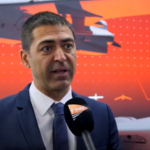The debate about achieving net zero and sustainability was a hot topic at Paris Air Show, and Reaction Engines was in attendance to showcase its technologies that can have a big impact in the area.
The 30-year-old company is best known for developing the synergetic air breathing rocket engine (SABRE). Tom Burvill, Applied Technologies Director, Reaction Engines told FINN, “Part of that development program was really developing the heat management technologies to enable the cooling of the 1000-degree inlet air at high speeds. And that cooling technology we’re now finding really good fits within adjacent markets across transport and particularly aviation, and things like fuel cell powered aviation.”
SABRE technology
When it comes to true net zero operations, cooling can be a big challenge in the fuel cell powertrains and Reaction Engines is using its work in the SABRE program to address this by enabling the necessary cooling to happen without adding too much mass and too much drag to the aircraft, which is key to the commercial viability of those aircraft.
Collaboration to achieve net zero
Collaboration was also up for discussion in helping achieve true net zero by 2050. “Collaboration is a really key ingredient to actually get to success, that’s not just national collaboration it could be international, so Reaction Engines is in a really fortunate position with the backing it’s got.”
And when it comes to challenges, Burvill was positive about the opportunities available. “Most of the challenges we’re seeing are technical challenges, which for engineers is very exciting. It is good to be able to play a part in some of the challenges that are facing the whole world. There will inevitably be other challenges that will be more frustrating and will rely on governments and other bodies helping out and being able to facilitate the environment so that companies can work together collaboratively and take the technology through to fruition.”

